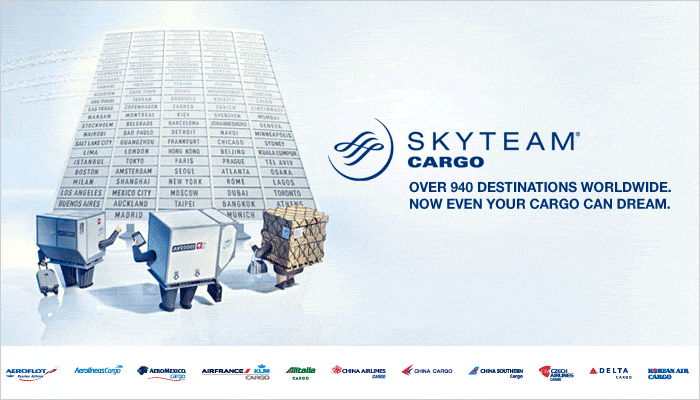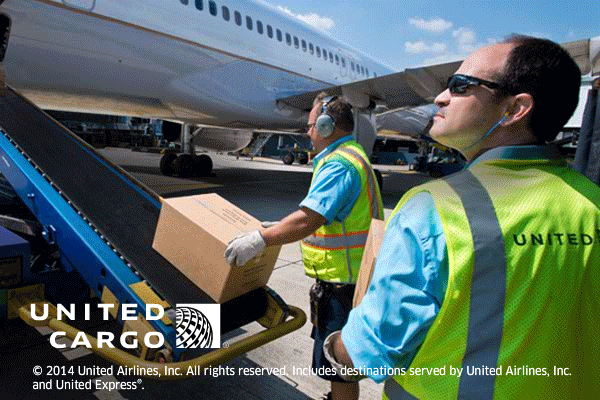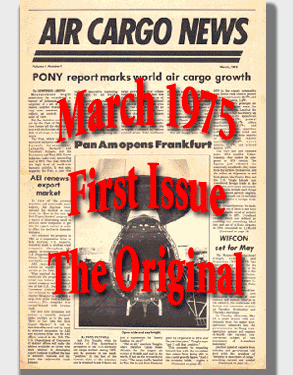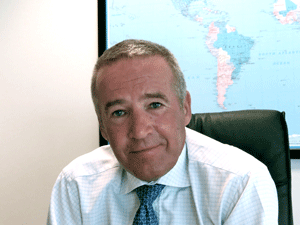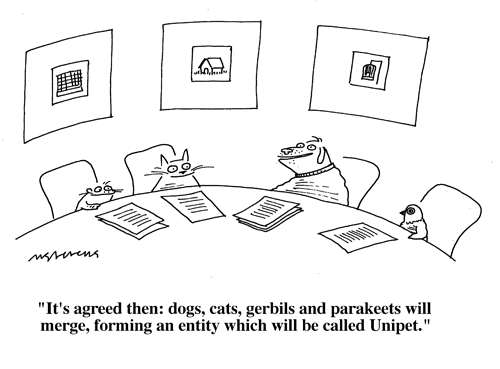
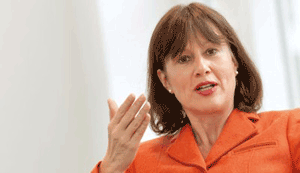 Frankfurt
Germany’s Commerzbank Arena is all about business, as cargo security
took center stage April 1 in a confrontation that suffered no fools. Frankfurt
Germany’s Commerzbank Arena is all about business, as cargo security
took center stage April 1 in a confrontation that suffered no fools.
The local Bundesliga soccer team that populates
the venue might have spent the day thinking about their future, but for
the hard working, business-challenged air cargo industry, tomorrow hung
on today, as "Recognize Risks – Build Alliances" brought
Sabine Wiedemann, head of group security at Daimler AG Stuttgart, to emphasize
the theme—the need for partnerships throughout the supply chain.
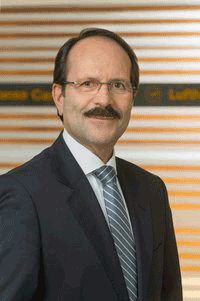 Calling
Dr. Rupprecht Calling
Dr. Rupprecht
Dr. Karl-Rudolf Rupprecht, head of the management
board for operations, Lufthansa Cargo, opened the proceedings by referencing
the previous conference 2 years ago, at which time the EU mandate for
shipper certification was the focal point; with all the anticipated challenges,
many of them fortunately didn't materialize. In contrast to 2012, the
proposed use of canines for screening has since been successfully adopted
in Germany. However, the transfer cargo related procedures are a cause
for concern and are perceived to be a step backwards. The current topic
is ACC3 (Air Cargo Carrier 3rd Country), which Dr. Rupprecht said is “a
critical step to enhance the security of air cargo globally.”
Quality and costs are at the forefront and Lufthansa Cargo is keen to
ensure that air cargo transport remains economical.
Lufthansa Cargo, in cooperation with Kuehne
& Nagel and the German LBA (Luftfahrtbundesamt – Federal Aviation
Authority) stress tested the Electronic Consignment Security Declaration
(eCSD) pilot together with IATA, an illustration of how digitization can
be incorporated into cargo processes.
Keynote From
A Wolf
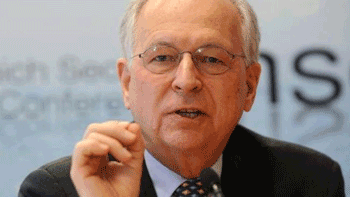 Wolfgang Ischinger, chairman of the Munich Security Conference and a veteran
foreign ministry official and former ambassador (in USA in 2001), delivered
the keynote speech. Herr Ischinger made his remarks against the backdrop
of the global security framework, which affects many aspects, including
transportation.
Wolfgang Ischinger, chairman of the Munich Security Conference and a veteran
foreign ministry official and former ambassador (in USA in 2001), delivered
the keynote speech. Herr Ischinger made his remarks against the backdrop
of the global security framework, which affects many aspects, including
transportation.
He remarked that the question of Ukraine
raises the prospects of whether the generally acceptable world order has
been uprooted by Russia's actions, although various countries interpret
it differently.
Putin's aggressive behavior is perceived
by Ischinger as a sign of weakness and not strength—almost a panic
reaction.
Can the Europeans and the West manage the
challenge of stabilizing the Ukraine?
That remains the central question of our
time; however, in Ischinger's view, Syria is actually the real looming
danger, especially to Europe and the international community in general.
USA Retreats
BRICS Rising
According to Ischinger, the world is living
through some of the greatest upheavals in the last 100 years; the retreat
of the U.S., the rise of China, BRIC countries’ developments—with
the historical challenge being the impact these developments will impose
on global governance in Europe and the U.S., whose population and economic
might are in decline for good.
Now The Good
News
In the good news category, Ischinger mentioned
fewer wars among states in every decade since 1950, and fewer people killed
because of conflict. However, internal strife has increased exponentially,
citing Afghanistan, Somalia, and Central African Republic as examples.
History &
Goals
Following WWII, Germany was an anti-status
quo country, a sentiment that peaked in 1990; more recently, Germany has
had a love affair with the status quo.
The goal for Germany ought to be that, in
light of these massive global changes, the population needs encouragement
from politicians to embrace change, and become less risk averse.
In parallel, further harmonization and integration
in Europe by the 28 EU member countries is, in his view, the right way
to be positioned to cope with world events effectively. Political decisions
must be made to take advantage of synergies in defense and security, rather
than continue as 28 individual countries.
Hooray
For Harald
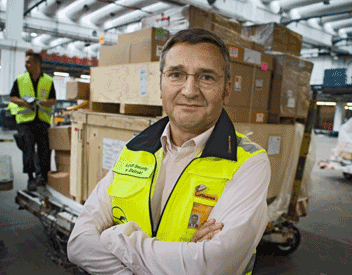 Harald Zielinski, head of security and environmental management, Lufthansa
Cargo, presented "2020 in View"—security strategy for
air freight in times when change is the only constant. Shipper certification
turned out to be less problematic than anticipated and all parties cooperated
exceedingly well, staving off the shipment avalanche many feared would
result. Lufthansa Cargo is building the most modern and efficient logistic
center in the world at Frankfurt Airport, to the tune of more than €700
million Euro investment, due to open in 2020.
Harald Zielinski, head of security and environmental management, Lufthansa
Cargo, presented "2020 in View"—security strategy for
air freight in times when change is the only constant. Shipper certification
turned out to be less problematic than anticipated and all parties cooperated
exceedingly well, staving off the shipment avalanche many feared would
result. Lufthansa Cargo is building the most modern and efficient logistic
center in the world at Frankfurt Airport, to the tune of more than €700
million Euro investment, due to open in 2020.
Key components of LCAG's security strategy
include staying close to its customers, maintaining quality, deploying
eCSD, ACAS (in the U.S.), EU PRECISE in conjunction with ACC3 (certifying
9-10 Lufthansa Group stations by end 2014), and segregation of shipments
from "green line" countries with security completed at the origin,
thus eliminating the need for repeated security checks down the line.
Regulatory bodies are challenged to streamline
their respective processes. No single technology by itself satisfies security
requirement; therefore, looking ahead to 2020, the operative word is to
be proactive rather than reactive.
Harald encouraged all participants in the
air cargo chain to rise to evolving challenges and work together because
100 percent security remains elusive.
A panel discussion followed with Wolfgang
Ischinger; Ingo Rahn, executive VP global airfreight DHL Global Forwarding;
Jörg Mendel, president LBA (Federal Aviation Authority); Gerold Reichle,
director/head of department BMVI; Peter Andres, head of corporate security,
Deutsche Lufthansa AG; and Franz-Josef Hammerl, director/head of department
BMI (Federal Ministry of the Interior). The
issue of the reciprocity principle as it relates to security was addressed;
panelists were in agreement that cooperation is key at the EU level rather
than bilateral agreement (as practiced vis-à-vis the U.S.) to reflect
both internal and external security aspects. A strong and united European
community offers a better platform for an integrated security regime.
Delays for transit freight are a critical issue; complexity costs money,
therefore, harmonizing security is paramount for all participants. The
inward look reveals that the various EU member countries still have different
regulations and interpret them differently; hence the starting point is
clearly the challenge in Europe. Franz-Josef
Hammerl disagreed with other panelists regarding transfer freight, for
which he believes transit security controls are essential. Winfried Hartmann,
FRAPORT/Air Cargo Club Germany, asked Herr Hammerl why credit card companies
use trend analysis routinely to proactively identify suspect transactions
while the security checks lag far behind, necessitating repeated transit
security checks. Hammerl acknowledged that developments are moving in
that direction; however, implementation will only be completed by 2020.
Additional risks stem from high dependence
on cyber security given the widespread use of IT and the related issue
of data integrity. EU employs 100 inspectors to audit security measures;
Peter Andres said he'd welcome the EU investing in at least 10 employees
to work on innovation and security concepts because otherwise the industry
would not be able to keep up with change and future challenges. Ingo Rahn
commented that the industry is well integrated in the security discussions
with the TSA in the USA and on the way in Europe, which is more fragmented.
He lamented the insufficient global standards for security, recognizing
the varying level of development across the globe, a constant challenge.
Further
Discussions
Birgit Loga, head of department, Federal
Aviation Authority, in her presentation touched upon the organization
structure that started with "Referat B6" and a couple of staff.
As of July 15, 2011, Abteilung Luftsicherheit (department air transport
security) has been established and staffed, fully functional at 7 locations
encompassing 6 departments (known shipper, audit, training and testing,
legal, control technologies, etc).
There were 958 companies with 2,300 sites awaiting
certification—shippers plus 3PLs. Currently 953 companies have been
certified with 1,796 sites comprised of business shippers and transportation
companies. ACC3 refers to air cargo and mail carriers operating into the
EU from a third country airport with the deadline for compliance set for
June 30, 2014. There are 82 certified EU audit/validation inspectors,
with 25 in Germany responsible for quality control of a secure chain of
custody for the participants. Departmental aims include the need for support
from government officials for sufficient resources to staff and ensure
uniform procedures and processes at all locations. A new project has been
launched with the Technical University in Hamburg for a transport security
program. Birgit Lorga would like to establish
a cross-industry working group to serve as a sounding board and solicited
participation by those present.
In his remarks, FRAPORT's Winfried Hartmann
lobbied for the ACD (air cargo club Deutschland), which has 250 members
and was founded in 1963 to promote air cargo in Germany. Its declared
focus is the further development of ground procedures (the potential of
e-Freight, meaningful evolution of air cargo security measures, speeding
up interfaces of on/off airport, embedding Customs processes); support
removal of regulations (curfews, implementation of liberal transport regulations,
promoting the presence and subject of air cargo in the public); and cooperation
with education institutions (mentoring programs to develop logistics talent,
commissioning projects relating to the improvement of ground handling
processes, support for the House of Logistics).
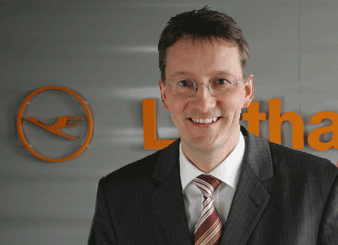 Thilo
Schäfer, VP Global Handling Management for Lufthansa delivered the
"Digitization Using the Example of the eCSD" presentation. He
expressed frustration that air cargo is too slow to implement and roll
out new technologies in an industry where modernization is urgently needed.
Thilo went on to say that “Transparency along the supply chain is
essential for efficient and safe logistics services.” Thilo
Schäfer, VP Global Handling Management for Lufthansa delivered the
"Digitization Using the Example of the eCSD" presentation. He
expressed frustration that air cargo is too slow to implement and roll
out new technologies in an industry where modernization is urgently needed.
Thilo went on to say that “Transparency along the supply chain is
essential for efficient and safe logistics services.”
This is the opportunity to streamline the
complex and divergent processes of the supply chain participants. His
charts indicated an industry total of 24 million air waybills per annum
(312 million touch points), 42 million HAWBs (546 million touch points),
and 2.4 million security declarations (33.8 million touch points). These
volumes simply cannot be processed without leveraging advanced technological
advances.
The implementation of eAWB is the first
step in digitizing core transport documents with the aim of achieving
100 percent comprehensive eFreight by 2020 (LCAG has reached 40 percent
presently). He listed eCSD benefits including: compliance, simplification,
transparency, integration (processes and data), process efficiency, data
quality, and productivity. There is a need to change to remain competitive
while roadblocks to implementation included IT systems, data quality,
and regulations, which drive high transaction costs. eFreight requires
close cooperation of all stakeholders. Proof of concept projects are ongoing
in key countries including Canada, Switzerland, UK, Germany, and Netherlands,
with global rollout envisioned by 2016 in 80 percent of all trade lanes
(airport-to-airport). “Digitization offers the potential for the
air cargo industry to make great strides in pushing efficiency and customer
convenience.”
 |
The afternoon panel discussion had Jürgen
Knipfer, supply chain security manager Siemens AG; Winfried Hartmann;
Götz Wendenburg DSLV (German Forwarders Federation) & K+N; Birgit
Loga; and Harald Zielinski. The moderator prompted discussion concerning
security costs and Hartmann's example was a system to prevent bird strikes,
which has been developed by the military and was acquired at very high
cost. K+N Wendenburg noted that the security budget represents a significant
amount for the company. Knipfer suggested a unified and harmonized security
standard and certification criteria, which encompasses all its elements,
training, procedures, and implementation. Harald
commented that it was a future goal, but it would take time to get there.
Wendenburg added that training has to be simplified and made more efficient,
eliminating some things in the curriculum that have nothing to do with
security. Hartmann reiterated that screening ought to take place up in
the supply chain at the factory to avoid airport bottlenecks, and that
a mix of all currently employed security screening technologies are the
best way forward. “On the technology side there is nothing better
than a dog's nose” according to Harald, and “there is nothing
extraordinarily new coming online in terms of security screening.”
An interesting loop in the commentary ensued,
with concerns about the national competitiveness of European airports
where, according to Hartmann, LUX, AMS, and BRU have more liberal security
systems, which cause some non-German carriers and customers to avoid bringing
certain cargo to FRA where the processes are more exacting, time consuming,
and expensive. However, at the end, Knipfer got applause for reminding
everyone that security remains the main goal, well worth pursuing and,
if other airports elsewhere cut corners to gain business, at least Germany
was doing the right thing. Taking the long
view, Harald Zielinski ventured that he doesn't believe that in 10 year’s
time some of the 1,000 km-long trucking lanes would remain sustainable
from a security point of view while safeguarding the integrity of the
custody chain. Truckers remain the weakest link with potential for fraud,
theft, and security risks.
The conference ended with participants receiving
a USB memory stick containing the new “Handbuch Luftfracht”
(air cargo handbook), available only in German, authored by Prof. Elmar
Giemulla, Bastian Rothe and Harald Zielinski.
Stay safe until 2016 when this conference
returns.
Ted Braun |
